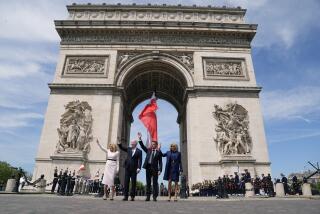France Accuses U.S. Diplomats of Espionage
- Share via
WASHINGTON — In the most public espionage rift between the two allies in almost 20 years, France charged Wednesday that several American citizens, including diplomats, had engaged in espionage and demanded that they leave the country.
According to the newspaper Le Monde, which first reported the story Wednesday, the Americans allegedly are members of the CIA, and some have been under surveillance by the French since 1992 for economic and political espionage and for trying to recruit key officials. Le Monde reported that four diplomats and one U.S. citizen living in France were involved.
The official French statement was brief and contained few details. “The U.S. Embassy has been told several times in recent weeks that U.S. citizens, among them diplomats, were taking part in activities incompatible with the status under which they are living in France,” said the statement, issued jointly by the Foreign and Interior ministries in Paris. The French move fell short of an expulsion.
The State Department late Wednesday called the press reports unwarranted and scolded the French government for its public treatment of the dispute.
“The handling of this matter in France is inconsistent with the approach that allies have taken to resolve sensitive matters in the past,” said a statement from spokeswoman Christine Shelly. “We are reviewing the implications of this incident.”
But the statement did not deny that France had asked for the recall of the unnamed U.S. diplomats.
In private, U.S. officials charged that the publication was a deliberate leak intended to divert attention in France from an internal wiretap scandal involving key Cabinet officials before national elections. “You have to look at domestic French politics to see why this is happening,” one U.S. official said.
With elections scheduled for April, French Prime Minister Edouard Balladur and Interior Minister Charles Pasqua now face allegations of approving illegal, politically motivated wiretaps--a story that has dominated French news in recent days.
Balladur has been the front-runner in the race to succeed President Francois Mitterrand. And Pasqua, one of the most powerful Cabinet ministers, is known to want to become the next prime minister.
The Direction for Territorial Surveillance, or DST, the counterintelligence agency that is in Pasqua’s ministry, reportedly uncovered the spies. Pasqua wrote to Mitterrand last week about “clandestine research,” U.S. attempts to recruit French officials and interference in French affairs, Le Monde said.
The article claimed that U.S. agents attempted to recruit French officials in key ministries. Among them, it said, was a senior member of Balladur’s personal staff, who was detected and fired. Others allegedly included a Communications Ministry official in charge of cable and satellite issues and a technical official of the French telephone service.
French officials said all three targets played along, allowing the Interior Ministry and the DST to get photographs and documents of U.S. espionage attempts.
The alleged American agents were particularly interested in information about the French position during tense negotiations between the United States and Europe on the General Agreement on Tariffs and Trade, Le Monde reported.
But a former CIA official labeled the charges “ludicrous.” U.S. intelligence has been engaged in information gathering in allied countries but is not using the classic tactic of suborning officials for espionage in exchange for some form of reward, said Vince Canistraro, a former senior U.S. intelligence official.
“There’s a fine line between legitimate information gathering and espionage. But I don’t believe anyone was caught giving money to a French official to get him to betray his country,” he said.
The CIA would not comment.
But Clinton Administration sources charged that Paris was being hypocritical. France has, in fact, been one of the biggest offenders worldwide in economic espionage. “This is the pot calling the kettle black,” a U.S. official said.
Canistraro added: “We’ve often caught the French with their hands in the cookie jar. It’s almost a constant thing with the French, who’ve engaged in full-scale economic and technical espionage against us for the past 10 years.”
The problem has led to quiet requests by Washington to withdraw French diplomats--the normal procedure between allies. Among the most recent, according to former U.S. intelligence officials, was a request that two French diplomats be withdrawn after they tried to obtain from U.S. manufacturers “Osprey technology,” which enables aircraft to take off vertically.
Last year, the National Journal, a political weekly, reported on a 21-page document prepared by French intelligence targeting 49 American high-tech firms, 24 financial institutions and six American government agencies for collection of trade intelligence.
At a lunch with reporters Wednesday, Balladur said: “Such things take place regularly on each side of the Atlantic. The French people are the friends of the American people. The French government is a friend of the American government.”
Also Wednesday, U.S. Ambassador Pamela Harriman met with Balladur for half an hour in what French sources said was at least her fourth session with French officials over the last month on the spy issue.
In Washington, White House Chief of Staff Leon Panetta said: “We are in discussions with the French. As far as I know, our relations are still sound.”
The last intelligence flap between the two countries was the 1976 publication by a French newspaper of a list of alleged CIA agents in France.
Sarah White of The Times’ Paris Bureau contributed to this report.
More to Read
Sign up for Essential California
The most important California stories and recommendations in your inbox every morning.
You may occasionally receive promotional content from the Los Angeles Times.










